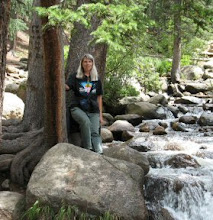 As friends in the CCC alumni group used to say, "Before Earth Day, there was the CCC!" (Civilian Conservation Corps, 1933-1941) The CCC does have a reputation as this nation's first big organized attempt at environmental protection, pre-dating the first Earth Day by as much as 37 years. But times were different then, and its record, sad to say, is mixed. Despite reforestation and fire-fighting efforts (now not universally appreciated), the CCC boys engaged in a number of less environ-mentally positive projects by today's standards.
As friends in the CCC alumni group used to say, "Before Earth Day, there was the CCC!" (Civilian Conservation Corps, 1933-1941) The CCC does have a reputation as this nation's first big organized attempt at environmental protection, pre-dating the first Earth Day by as much as 37 years. But times were different then, and its record, sad to say, is mixed. Despite reforestation and fire-fighting efforts (now not universally appreciated), the CCC boys engaged in a number of less environ-mentally positive projects by today's standards. Among those were rodent control (including kangaroo rats in California and prairie dogs everywhere in the west); rattlesnake slaughter (serving no known purpose and somewhat contradictory to the required rodent control); predator control (400,000 predatory animals annihilated, again increasing the necessity for rodent control); eradication of some 300 million native Ribes shrubs (gooseberries and currants, which carry white pine blister rust, white pine being the preferred species); and drainage of wetlands (then called "swamps") for mosquito control.
 In all, according to Nature's New Deal, by Neil M. Maher, they modified 118 million acres. Presumably that total doesn't include the building of roads in wilderness and national parks. All of these won the CCC the enmity of local and national conservationists, among them Aldo Leopold, Bob Marshall, and Rosalie Edge.
In all, according to Nature's New Deal, by Neil M. Maher, they modified 118 million acres. Presumably that total doesn't include the building of roads in wilderness and national parks. All of these won the CCC the enmity of local and national conservationists, among them Aldo Leopold, Bob Marshall, and Rosalie Edge.Don't get me wrong— I still think the CCC was probably the best public work program to date...
Before Earth Day, however, and even before the CCC... there was Arbor Day. Proving that nothing we humans do is an unalloyed blessing, even an innocent-looking
 holiday like Arbor Day has its dark side. I even wrote a somewhat critical article about 12 years ago. These days, when we need all the CO2-gobbling plants out there we can get, maybe I should re-evaluate my opinion. I'll still find it hard to believe we need trees everywhere, though—no matter what species, no matter where. I'm too fond of grasses for that! Another reason is that some researchers have shown that grasslands can be as effective as forests at reducing carbon dioxide.
holiday like Arbor Day has its dark side. I even wrote a somewhat critical article about 12 years ago. These days, when we need all the CO2-gobbling plants out there we can get, maybe I should re-evaluate my opinion. I'll still find it hard to believe we need trees everywhere, though—no matter what species, no matter where. I'm too fond of grasses for that! Another reason is that some researchers have shown that grasslands can be as effective as forests at reducing carbon dioxide. Of course, science marches on, and you can also find research that demonstrates the opposite effect. Your choice!

No comments:
Post a Comment